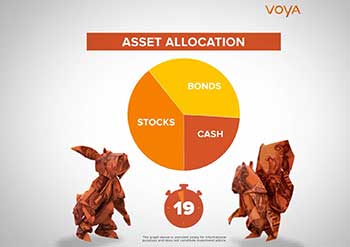Saving for retirement is one of the most important financial decisions you can make. Choosing the right retirement plan provider is key to helping you reach your retirement goals.
Two popular providers are TIAA and Voya. Let’s take a closer look at the key features, pros, and cons of each to help you decide which may be better for your needs.
A Brief Comparison Table
| Feature | TIAA | Voya |
| Fees | Higher fees on average, especially for 401(k) plans | Lower fees on most products including 401(k) plans |
| Investment Options | Over 40,000 mutual funds, CREF accounts, annuities | Broad mutual fund selection including cheaper institutional share classes |
| Customer Service | Mixed reviews, complaints about long phone waits | Highly rated for website, mobile access and call centers |
| Nonprofit Focus | Specialized service and products for educators, healthcare, research, etc. | Serves wide range of employers and individuals |
| 401(k) Administration | More limited plan options and higher average fees | Robust 401(k) plans with lower average administrative and investment fees |
| Retirement Advice | Access to personalized consultants for account holders | DIG online advice tool but no dedicated advisor team |
| Insurance Offerings | Competitive rates on annuities and life insurance for niche clients | Broader selection of insurance products for individuals |
| Company Type | Mission-driven nonprofit | For-profit company |
Overview Of TIAA
TIAA (Teachers Insurance and Annuity Association) is a financial services organization that offers investment and insurance products designed for those working in education, healthcare, research, and other nonprofit sectors.
Some key facts about TIAA:

- Founded in 1918 as a retirement plan for educators
- Serves over 5 million active and retired employees of more than 15,000 institutions
- Offers IRAs, annuities, life insurance, mutual funds, and managed accounts
- Has over $1 trillion in assets under management
Some pros of using TIAA for retirement savings:
- Nonprofit mission to serve those in academics, research, healthcare, etc.
- Wide range of investment options including target date funds and socially responsible funds
- Low fees on many products compared to commercial providers
- Access to personalized advice from TIAA financial consultants
- Lifetime income options through annuities
Some potential cons to consider:
- Limited 401(k) plan options compared to other providers
- May have higher fees than competitors on some actively managed funds
- Complex fee structure across different account types
- Mixed reviews on customer service experience
Overall, TIAA is best suited for those working in its core nonprofit markets. The fees are competitive for this sector and TIAA offers robust resources for retirement planning.
Overview Of Voya
Voya Financial is a commercial retirement and investment company serving employers and individuals.
Some background on Voya:

- Originally founded in 1871 as a life insurance company
- Spun off as an independent company in 2013 after divesting from ING
- Serves over 47,000 institutional clients and 13 million individual investors
- Offers 401(k)s, annuities, life insurance, IRAs, mutual funds, and more
Here are some of the pros for Voya retirement plans:
- Wide range of investment options from target date funds to brokerage accounts
- Robust online tools to manage your account and plan for retirement
- Often lower fees than competitors for 401(k) plans
- Strong customer service reputation and high marks for online access
- Flexible distribution options in retirement including lifetime income
Some potential downsides to note:
- Mixed reviews on some voluntary benefits like life insurance
- Lacks personal advisors of competitors like TIAA
- Less tailored approach given broad individual and employer client base
- Not as specialized for healthcare and education sectors
Overall, Voya is a leading choice for comprehensive 401(k) plans with low fees. The drawback is less personalized service Vs. options like TIAA.
Also Read: Comparison Between BlackLine And Trintech.
Tiaa Vs. Voya: Key Feature Comparison
Now let’s dive into how TIAA and Voya stack up on some key features retirement savers should evaluate:
Investment options
- TIAA offers access to more than 40,000 mutual funds plus annuities. Voya also gives clients expansive fund choice including cheaper institutional share classes. For range of investment selection, TIAA and Voya are comparable.
Fees
- On average, Voya has lower expense ratios on its funds than TIAA. For example, an S&P 500 index fund is 0.05% at Voya versus 0.15% at TIAA. But TIAA’s nonprofit mission does lead to lower fees for some options like annuities.
401(k) plan administration
- For 401(k)s, most surveys find Voya is cheaper than competitors. TIAA’s fees are higher than Voya’s for recordkeeping, administrative costs, and investment expenses on 401(k)s plans.
Customer service
- Voya is highly rated for its call centers, online tools, and mobile apps. TIAA has faced criticism for long call center holds and complexity contacting representatives. Voya has an edge in customer service reviews.
Nonprofit specialization
- TIAA has unique expertise for education, research, healthcare, and government/nonprofit employees. Voya serves these sectors but has a less tailored approach.
So in summary, Voya appears to have lower fees and better service. But TIAA brings deep expertise for its core nonprofit clients.
Also Read: Comparison Between VALIC And TIAA.
Choosing Between TIAA And Voya
So which provider is right for you? Here are a few factors to help decide between using Voya or TIAA for retirement savings:
- Your employer – Some organizations only offer one provider. See what plans your company has.
- Current plan fees – Compare costs of TIAA plans to Voya alternatives if you have a choice. Voya often wins on 401(k) fees.
- Customer service needs – If online access and call quality matter, reviews give Voya an edge.
- Retirement expertise – For tailored advice for educators or researchers, TIAA’s specialized consultants are valuable.
- Annuities or life insurance – TIAA’s annuity and insurance products cater to its core clients. Voya offers more choice for individuals.
For most individuals, Voya likely offers lower fees and more user-friendly service. The fifty-state availability is also a plus for portability. But for those in academics, healthcare, research, or related fields, TIAA’s nonprofit approach may warrant the higher costs for some.
Also Read: Comparison Between Aflac And Blue Cross Blue Shield.
Frequently Asked Questions (FAQ)
TIAA is a solid choice thanks to its nonprofit mission, specialized advice, and investment options tailored to educators and researchers. Fees are competitive for target date funds and annuities. The drawbacks are higher 401(k) fees than commercial rivals and mixed reviews on customer service.
Most surveys find Voya provides lower average fees, more diverse investment options, and better online tools than competitors for 401(k) plans. However, Voya does cater to a wide range of employers rather than specializing in a niche. Still, overall Voya is considered one of the top 401(k) providers.
TIAA actually offers 401(k) plans in addition to other account types like IRAs and annuities. Compared to a typical 401(k), TIAA’s versions tend to have higher fees but offer access to personalized advice from TIAA’s consultants. For those eligible, the potentially lower cost of a TIAA IRA over a 401(k) may be worth exploring.
TIAA is a long-standing provider with specialized expertise in serving educators, healthcare workers, researchers and other nonprofit employees. It has a mission-driven approach focused on improving outcomes for these groups. While high 401(k) plan fees and inconsistent service reviews are weaknesses, TIAA is still considered one of the top firms for retirement services geared for its core clients.
Also watch this video about Tiaa!
The Bottom Line
When choosing between Voya and TIAA for investing retirement savings, weigh factors like total fees charged, customer service accessibility, available investment options, and any specialized needs based on your profession or employer.
For most mainstream retirement savers, Voya likely offers lower costs on 401(k)s and a better customer experience. But TIAA shines for those in academics, research, healthcare, and related fields who value TIAA’s tailored nonprofit approach.
Be sure to thoroughly research all costs, services, and investment choices before rolling over an existing plan or signing up for a new one. Finding the right retirement plan provider is essential to maximizing your savings over the long run.
